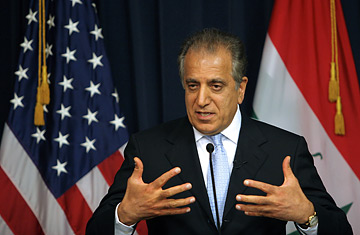
Outgoing U.S. Ambassador to Iraq Zalmay Khalilzad gestures as he speaks during a press conference in the heavily fortified Green Zone in Baghdad, March 26, 2007. Khalilzad admitted today that Americans had talked to insurgent-linked groups in a bid to isolate al-Qaeda and bring rebels into the political process to end Iraq's bloodshed.
Khalilzad was instrumental in convincing the Sunni parties to participate in the December 2005 elections. But many of the promises that brought Sunnis into the government then have not been realized. The constitution, the writing of which was largely boycotted by Sunnis, has not been amended. And there has been nothing done to reform the vetting process that has blackballed many qualified officials who were tainted by complicity in Saddam Hussein's regime. Indeed, there have been several dramatic low points in Khalilzad's tenure in Baghdad: the bombing of the Samarra shrine that unleashed an unprecedented wave of ethnic cleansing and the mishandled execution of Saddam.
Khalilzad can at least tout disasters that have not happened as accomplishments: The Sunnis did not leave the government; the country managed to pull back from the brink of a full-blown civil war; the Iraqi parliament — however ineffective — did not dissolve. During the hour-long press conference, Khalilzad, who has made an art of providing quotes so diplomatic and academic that they cannot be sound-bitten, hedged every statement with a well-chosen adjective. Nevertheless, on balance, he saw hope ahead. He said the country was "fundamentally" heading in the right direction. He described himself as "cautiously" optimistic.
The Bush Administration has been heartened by the last month in Iraq. Khalilzad leaves as U.S. and Iraqi forces have converged to provide security in Baghdad and, he said, the Iraqi forces seem to be keeping up. Violence in the capital, he said, has "fallen nearly a quarter" since Operation Law and Order began six weeks ago. Iraqis are starting to trust their own security forces, he said, citing a steady amount of useful tips coming in during recent weeks. Also, there are indications, he said, that the tribes and some insurgents are turning on al-Qaeda in Anbar province. He added that some insurgent groups are negotiating with the Iraqi government to come into the political process. He successfully lobbied Prime Minister Nouri al-Maliki to pressure his political supporter Moqtada al Sadr to lay low during the rollout of the Baghdad security plan.
Khalilzad did admit that one of the toughest obstacles he faced was a "culture of consipiracy" among Iraqi politicians, rooted in years of oppression. Each small step in one direction was seen as a huge swing of loyalty. Getting them to trust each other has been an uphill battle, he said, especially when you consider that the Iraqis are faced with trying to do state building and nation building "at the same time."
Through all of this, Khalilzad said he has tried to impart to Iraqi politicians the impatience of Americans, that the American effort in Iraq is not an open-ended commitment. "We are an impatient people," he said. "I constantly signal to the Iraqi leaders that our patience, or the patience of the American people, is running out" — a point reinforced last week when the House voted to set a timetable for withdrawl of troops in Iraq in 2008.
Hammering that point home will be left to his replacement, veteran diplomat Ryan Crocker. Fresh from the critical post of Ambassador to Pakistan, Crocker is expected to start later this week. No stranger to the Middle East, Crocker has served as ambassador to Lebanon, Kuwait and Syria during his 36 years in the foreign service. He met his wife Christine working in the Baghdad embassy in 1979.
